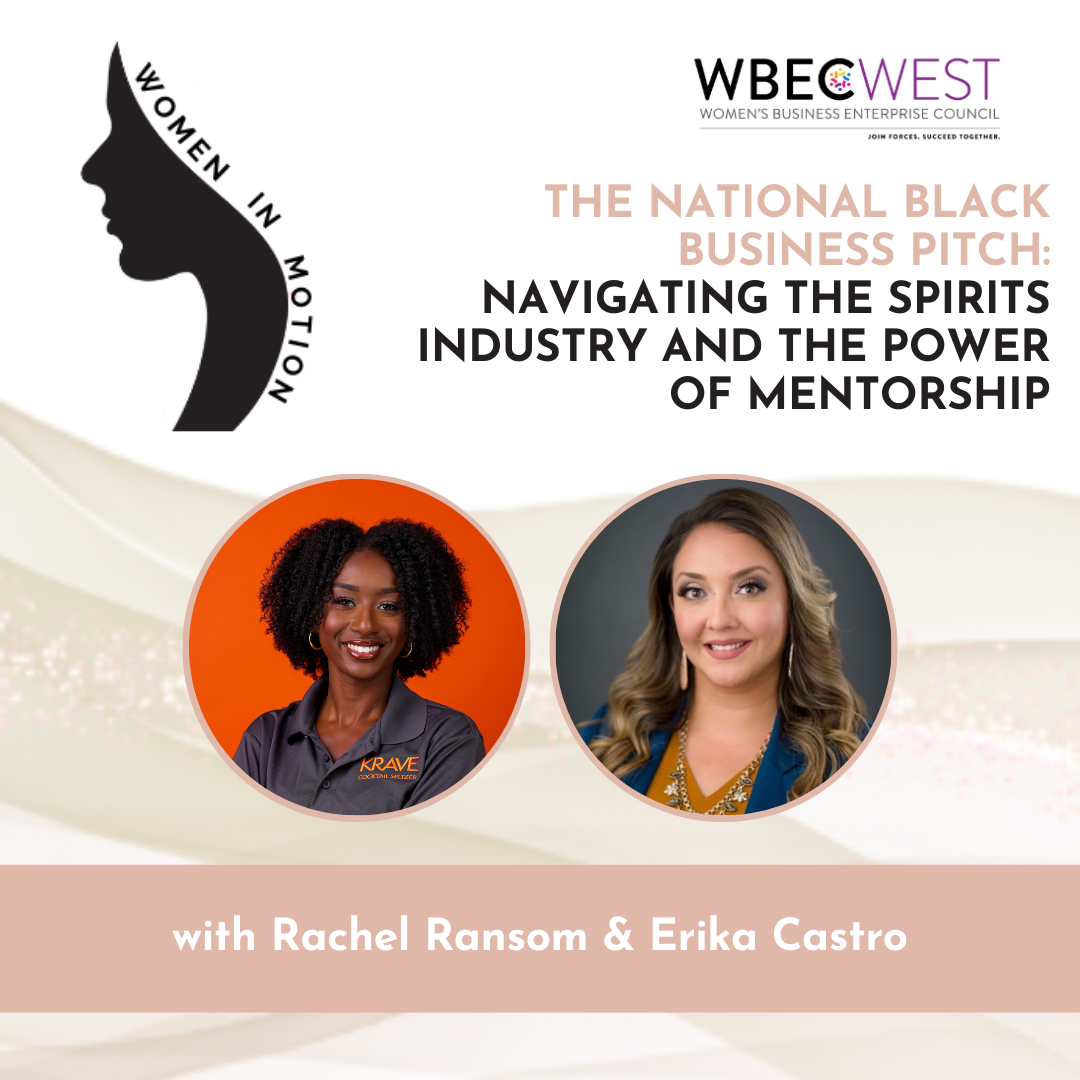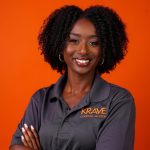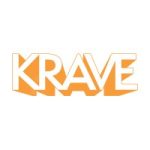
In this episode of Women in Motion, Lee Kantor speaks with Rachel Ransom, co-founder of Krave Cocktail Seltzer, and Erika Castro, a corporate representative from Salt River Project and Rachel’s mentor. Rachel shares her journey in launching Krave, a Washington D.C.-based canned cocktail brand, discussing the challenges of entering the spirits industry and the importance of pitch competitions for funding. Erika provides insights on mentoring, the significance of business certifications for minority and women-owned businesses, and the value of networking. The episode highlights the collaborative spirit and resilience needed for entrepreneurial success.
 Rachel Ransom is the Co-Founder of Krave Cocktail Seltzer, a vibrant brand dedicated to redefining the ready-to-drink cocktail experience.
Rachel Ransom is the Co-Founder of Krave Cocktail Seltzer, a vibrant brand dedicated to redefining the ready-to-drink cocktail experience.
A proud Hampton University alumna, Rachel launched her career in technology and real estate sales, where she honed her expertise in business development and relationship-building. This experience in high-energy industries fueled her passion for entrepreneurship and equipped her with the strategic mindset to bring Krave to life.
Today, Rachel channels her sales acumen and entrepreneurial spirit into expanding Krave’s presence throughout Washington, DC, with a particular focus on Virginia, her home state. 
She remains committed to creating a refreshing, quality cocktail brand that resonates with diverse communities and aims to make Krave a staple in the local spirits market.
Follow Krave on LinkedIn.
 Erika Castro is the Supplier Diversity and Supplier Management Manager at SRP Salt River Project.
Erika Castro is the Supplier Diversity and Supplier Management Manager at SRP Salt River Project.
SRP is a community-based, not-for-profit organization providing reliable, affordable and sustainable water and energy to more than 2 million people in central Arizona.
Follow the Salt River Project on LinkedIn, Facebook, X and Instagram.
Music Provided by M PATH MUSIC
![]() This transcript is machine transcribed by Sonix
This transcript is machine transcribed by Sonix
TRANSCRIPT
Intro: Broadcasting live from the Business RadioX Studios, it’s time for Women In Motion. Brought to you by WBEC-West. Join forces. Succeed together. Now, here’s your host.
Lee Kantor: Lee Kantor here, another episode of Women In Motion and this is going to be a good one. But before we get started, it’s important to recognize our sponsor, WBEC-West. Without them, we couldn’t be sharing these important stories. Today on Women In Motion, we have Rachel Ransom with Krave Cocktail Seltzer, and Erika Castro who is the corporate representative from Salt River Project. Welcome.
Rachel Ransom: Thank you.
Lee Kantor: All right. Well, before we get too far into things, let’s talk to Rachel about Krave Cocktail Seltzer. Tell us about your business.
Rachel Ransom: Yeah. So, Krave Cocktail Seltzer is a Washington, D.C. based and black women-owned canned cocktail seltzer brand. We launched the brand back in July of 2024, and we focused on creating your classic cocktail recipes in seltzer form. So, the recipe we have out right now is our Lemon Drop Cocktail, and we’ll be looking to add on a tequila-based cocktail in the upcoming summer.
Lee Kantor: So, what’s your backstory? How’d you get involved in this line of work?
Rachel Ransom: So, Krave was started by me and two of my friends. One of my friends had an idea to start a canned cocktail line, and then in perfect timing a spirits investment company called Pronghorn, who solely invests in minority-owned spirit brands, hosted a pitch competition for former HBCU students. Two of the three of us went to a Historically Black College, Hampton University, and so we applied for this pitch competition with our idea of Krave.
Rachel Ransom: So, basically, we just submitted a PowerPoint to them. They liked our PowerPoint, gave us startup money of $10,000, and flew us down to Miami to pitch to investors. So, from there, we utilized that money to hire a beverage formulator, hire a manufacturer, graphic designer, get the proper licensing. And had to put in some additional money of our own, but that really helped us get kickstarted and launch Krave in D.C.
Lee Kantor: Now, was that kind of the trajectory you were on prior to Krave? Were you going to be an entrepreneur? Were you looking for a venture like this?
Rachel Ransom: So, I was always going to be an entrepreneur, but I had no thoughts of getting involved in the spirits industry. Professionally, I sell cloud computing technology, so I’ve been involved in sales for a while. Outside of that, I had started about two years ago, gotten into real estate. I got my Virginia real estate license, which is where I’m from, and was a practicing realtor when this opportunity came. Since then, I have paused real estate. I still do my technology sales, but I’m all in on Krave.
Lee Kantor: So, what was part of that learning curve to get into the spirits industry? I’m sure you were aware of spirits, but you weren’t aware of the business of spirits.
Rachel Ransom: Right. No, it was a huge learning curve from what the licensing laws look liked state to state, to what type of information you have to have on your actual can, and so many things in between. What was really helpful for us was finding some mentors in the industry, so between the relationship we developed with the spirits investment company, Pronghorn, alongside finding some other canned cocktail brand owners who had been in the business for either a few years or up to 20 years, and utilizing them as mentors to help us learn what we didn’t know. But then, there were also a lot of instances of trial and error and figuring things out as we went along.
Lee Kantor: So, what was it like at the beginning stages where you have maybe an idea, but how do you kind of iterate that and make it come to life for that prototype, you know, first test beverage, are you just hanging out together, just mixing things in a pitcher, shaking it up?
Rachel Ransom: So, actually, that is kind of how it started. We thought of what were the one to two cocktails we want to start with. We landed on lemon drop and mojito. From there, we spent an afternoon making kitchen recipes, different versions of a lemon drop, and a mojito cocktail to see what we liked the best. We were looking for something that wasn’t too sugary, wasn’t too high in alcohol content, and also had a nice fizz, but also wasn’t too diluted by the soda water.
Rachel Ransom: So, once we finally landed on something that we liked, we interviewed probably 12 beverage formulators across the U.S. and landed on a great company out of Oregon called Sonoma Beverage Consulting. We worked with them, basically we sent them our kitchen recipe, and then they utilized commercial grade ingredients to recreate that recipe. And we went back and forth over about five or six iterations until we solidified what the the perfect Lemon Drop Cocktail would taste like.
Lee Kantor: So, you went from just hanging out to sending it to a formulator. You didn’t have like a mid-step of should we just bring this to a farmers market or just the public in general to see what they think?
Rachel Ransom: No. And honestly, looking back, that’s something we would do future state for our next run. We’d make a smaller batch so that we could get the community’s feedback on it to ensure we were on the right track. So, that was a risk that we were taking. But we knew we wanted to make this a beverage that could be eligible to be in retailers, so we didn’t want it to be something that we were, you know, just batching in our kitchens and then giving it to the public.
Rachel Ransom: So, with that, we knew we wanted to work with a beverage formulator. But we know that in the future we’d want to, again, work with the beverage formulator, but make a small batch quantity to have some sort of a focus group to test out the product before bringing it directly to shelves.
Lee Kantor: Now, did you have Krave as a brand that you had kind of a look and feel for that was kind of the foundation of this and then building the beverage to it, or was the beverage first and then you built Krave around that?
Rachel Ransom: So, the name was actually first. The name came from just we were going through a couple different names and wanted to find something that felt like someone was doing something. We wanted it to be an action verb, so Krave is something that we landed on. And then, from there we built the brand concept around it of thinking how can we differentiate ourselves from all of the cocktail seltzers that are already out there? So, our focus was, let’s focus on your classic cocktails that have a higher ABV than average, less amount of fizz, not as diluted, really flavorful. And so, that’s how we we got to what the beverage would be after establishing what the name would be.
Lee Kantor: So, what was it like when you have the idea, you find these folks in Oregon, you send them the idea, and at some point they’re sending you that first can that you have to crack open. And you’re like, “Well, I hope this tastes like I picture in my head”?
Rachel Ransom: Yeah. So, with our beverage formulator, they would send us back a small sample of bottles with the lemon drop cocktail in it. From there, once we finally got it finalized, we got the final recipe, and then we had to hire a completely separate vendor. We had to hire a manufacturer. So, the manufacturer would take the recipe that we got from the beverage formulator. They’d create it on a larger scale. So, for our first run of product, we did 1,000 gallons of the Lemon Drop cocktail, and then that’s who puts it in the actual cans for us to then sell to retailers. So, it was a long process.
Lee Kantor: And isn’t it a little nerve-racking because at each stage you got to, you know, hope that it’s the way that you picture? I mean, even like if you’re printing something, they still check the printer to make sure they’re printing colors exactly, right?
Rachel Ransom: Yeah. It was extremely nerve-racking, especially going from such a small sample size to a large production run.
Lee Kantor: Right. Like how many cans is that?
Rachel Ransom: So, that was 10,000 cans. And so, if something went wrong, that was a lot of money that was gone.
Lee Kantor: Exactly. That’s times 10,000.
Rachel Ransom: Yeah. Thankfully we found a manufacturer that was local. So, we found a company called Nidra down in Chesapeake, Virginia. And so, we were able to visit the facility before they created our drink. And we were able to be there as they were mixing the drink, so that before they put the mixed ingredients into cans, we were able to taste it and make sure it still tasted like our small batch recipe before going into the cans. So, that helped a little bit to make us feel a little more comfortable.
Rachel Ransom: Now we’re running another production with them actually this week. It’s double the size, so it’s 20,000 cans. And we’re not going to be there for them to put it in the cans because we just have to trust that they’re going to, you know, follow the same recipe. But, again, it is nerve-racking especially as you start to create more and more product.
Lee Kantor: Now, why was it important for you to become a part of the National Black Business Pitch series?
Rachel Ransom: Yeah. So, with having a business like Krave, like I said, we just launched in July, and we’re not at the point exactly where investors are willing to invest in us just because we don’t have enough history of proving ourselves in terms of revenue and growing and scaling our business. But we’re not in a place as three founders to self-fund this business completely on our own.
Rachel Ransom: So, utilizing pitch competitions has been extremely helpful for us to be able to fund our business and just continue with the next production run and things like that. So, after doing some research online and finding the National Black Business Pitch, it was really important for us to apply and hope to participate in hopes to obtain the necessary funding to keep pushing our business forward.
Lee Kantor: Now, what was it like working with Erika Castro as your mentor on this adventure?
Rachel Ransom: I had an awesome experience with Erika. First, Erika has a lot of experience judging pitch competitions, which was extremely helpful in terms of reviewing my pitch with her. I got some great feedback that, obviously, was really helpful in terms of winning the pitch competition. But Erika also gave me some great information that comes from the WBEC group in terms of applying for or getting my business certified as a minority business and as a woman-owned business. Because what I learned from Erika is that there are a lot of organizations out there that have specific funding to work with these minority or women-owned businesses. And so, if we can get ourselves certified in that capacity, that’s going to help us in terms of obtaining new and larger retailers.
Lee Kantor: Now, Erika, as a seasoned business person and business leader that you are, what was it like mentoring the folks from Krave?
Erika Castro: Well, I would just say it was so easy. And, Rachel, congratulations. I haven’t gotten a chance to tell you, but I am so proud of you.
Rachel Ransom: Thank you.
Erika Castro: I was just so delighted to hear that you won, so it was kind of, you know, a validation that the the feedback worked. But honestly, Lee, I don’t know that Rachel needed too much feedback because she was just great. She, I think, already had a refined pitch. I had recently come out of judging another pitch competition. There was a few things that we talked about in terms of tweaking her pitch, but other than that, I mean, I think she was ready and she was prepared.
Erika Castro: And the other thing that I will have to say, too, is I think people’s energy really shows to the audience, to the judges. And I think when you have someone that has the energy that Rachel has, I think it’s so easy to work with them and to believe that a company as young as theirs that started earlier this year, is in the place that it’s at. And so, that’s the biggest takeaway for me is, man, if someone really wants something, it is achievable. And, obviously, it’s so much work to get there, but it just makes me really proud. So congrats, Rachel.
Rachel Ransom: Thank you.
Lee Kantor: Now, Erika, do you have any advice for other people doing pitch competitions or leaning on pitch competitions as a way to launch their venture? Are there some do’s and don’ts, you know, as being somebody who has judged these events and mentored these events? What are some do’s and don’ts for someone that’s entering their first pitch competition?
Erika Castro: Yeah. I mean, I think I would just say, before you probably come to a pitch competition, you probably want to have done a lot of homework and your research on what your business is. And I think Rachel kind of showcased that. She was a perfect example of that with her and her teammates at Krave because, as you heard, there was so much backend that had to be done before she even got to that point. And to even be able to navigate the beverage formulators and the manufacturers and all of that, I feel like there’s just so much backend and homework. So, that’s what I would recommend is, obviously, be able to do your homework.
Erika Castro: And then, I’m sure people have heard of the Business Model Canvas, but use that to your benefit. Because I think once you kind of know who you’re trying to target in terms of a customer, what do you want your company to look like in terms of a brand, what do you want people to think, see, and feel when they’re interacting with your brand, and so I think all of those things you can kind of lay out with developing a really great Business Model Canvas.
Erika Castro: And so, that’s what I would say is, before you kind of embark in any of these pitch competitions is make sure you kind of have that ready. Because I think for Rachel and her team, it was kind of a natural next step in terms of the recommendation that I provided to get certified, because it just opens up the opportunity for more markets, and for other corporations to maybe have their beverage in their supermarkets. And a lot of companies are trying to find women-owned, minority-owned businesses to feature, and so by them having the certification, it’s only going to be a benefit.
Lee Kantor: Now, Rachel, is there any advice you can give to people doing their first pitch? It sounds like you guys did a great job of preparation, but is there anything maybe from the nervousness or the actually getting on stage or getting in front of people and sharing maybe for the first time, is there anything you learned from that experience?
Rachel Ransom: Yeah, absolutely. And I think there’s a differentiator between a pitch competition that’s virtual versus in-person. Virtual being that it’s easy to have that pitch and presentation mode and read off your notes. But I think the biggest thing, one, is to make your pitch conversational. You don’t want it to feel to the judges that you’re just reciting a script. And then, if you are pitching in-person, it’s always great if you can memorize the pitch versus reading off of note cards, but it takes a lot of practice to be comfortable and confident and conversational in how you deliver your pitch.
Rachel Ransom: So, I just think that continuously practicing to different people to get their feedback, seeing what kind of questions they have from your pitch, that way, you can intertwine those answers in your pitch, and that’s one less thing that the judges have to ask you. I think that’s that’s a big thing, so practicing and specifically doing so in front of different audiences to get different perspectives.
Lee Kantor: Now, Rachel, if somebody wants to learn more about Krave, is there a website? Where are you at in your rollout?
Rachel Ransom: Yeah, absolutely. So, right now, Krave has placement across 21 to 22 retailers in Washington, D.C. In January, we will be expanding across the State of Virginia as well to be in grocery retailers. And if you want to keep up with Krave in terms of knowing what stores we’re located in and what events we’re hosting on a monthly basis, you can go to our website at drinkkrave – with a K – .com or @drinkkrave on Instagram.
Lee Kantor: Now, Erika, before we wrap, I know Rachel isn’t a WBEC member just yet, a WBEC-West member just yet. But for folks who are at this stage, do you have a recommendation, when would you become part of the WBEC-West community? Like, what’s the right time for a business to join the WBEC-West community?
Erika Castro: I think anytime you want to kind of expand to new markets – like in Rachel’s case, she’s expanding to Virginia – anytime you want to have any new retailers, I think that kind of just opens up the door. So, I would say for a business like hers, absolutely, I would say you do that right away. Not only does it provide access to potential retailers and companies that could have your brand, but I think it also expands your network. And they do say that people do business with who they trust. So, the more that you can develop those relationships, I think the more people are willing to listen to you. And I’d love to see Krave come to Arizona and everywhere else.
Rachel Ransom: Yes.
Erika Castro: So, that’s the next goal, Rachel, let’s get this across the country.
Rachel Ransom: Absolutely.
Lee Kantor: So, Rachel, what do you need more of? How can we help you?
Rachel Ransom: What do we need more of? Honestly, to take us to the next level, we definitely need more funding so that we can fulfill larger orders for all of the grocery retailers that we’re starting to inquire with. So, from our team standpoint, we’re going to continue to participate in pitch competitions and start looking for investors as we get closer to the summer.
Lee Kantor: All right. Well, Rachel and Erika, thank you so much for sharing your story today. You’re both doing such important work and we appreciate you.
Rachel Ransom: Thank you for having us.
Erika Castro: Thank you.
Lee Kantor: All right. This is Lee Kantor, we’ll be back next time on Women In Motion.














